Passing down family traditions while teaching skills in the kitchen is all part of the homesteading lifestyle for American families. Children can and should be an integral part of this process.
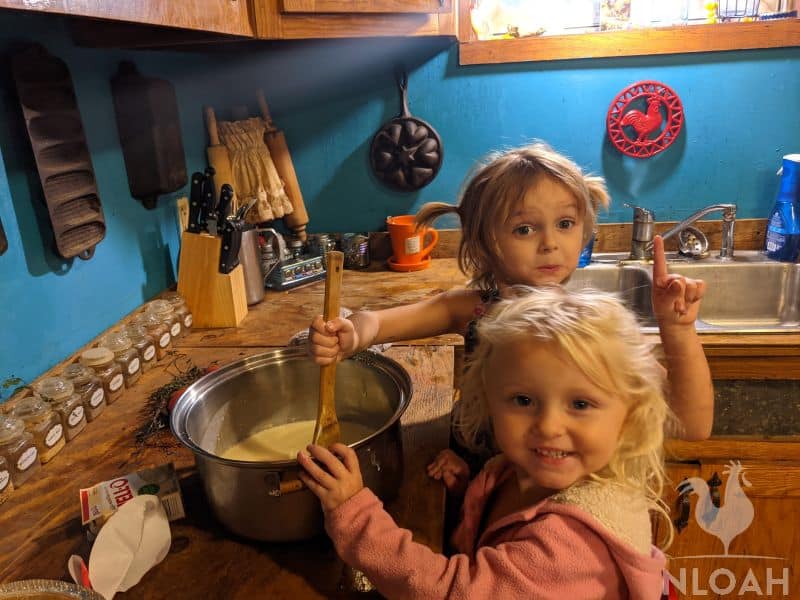
The key to kids in the kitchen success requires parents take into account both the age and the maturity level of the children before assigning a task.
Homesteading memories are often made in the kitchen. In the summer and fall, this area of the house is bustling with activity as produce is picked from the family’s garden and fruit grove.
Foraging for wild blackberries and other edibles also leads to delicious smelling and tasting treats being created in the homesteading kitchen.
Oh, and then comes the glorious bounty of fall. Baskets of wild or cultivated nuts are collected and brought into the kitchen for processing.
As do one of the most highly anticipated tastes of autumn – pumpkin. Who can resist being lured into the kitchen when a sweet pumpkin treat is baking in the oven?
Children should be a part of all these kitchen activities – and many more, as soon as they are ready. Skill building can begin in small and supervised bits when the children are toddlers.
Why Children Should Be Fully Immersed in Kitchen Activities
- To learn that food does not have to come from a grocery store.
- To learn homesteading skills.
- As a bonding experience with at least one generation of older adult family members.
- To learn, then cherish and ultimately share with their own children, beloved family traditions.
- To infuse kitchen tasks into a homeschooling math,, and science curriculum. Helping mom or dad cook in the kitchen is also a superb way to reinforce reading and comprehension skills via the following of a recipe.
- To teach responsibility and time management skills that can last a lifetime.
- To offer instruction about nutrition and healthy eating.
- As a way to introduce natural remedy making.
- To showcase forest to table food options from wild edibles the children helped forage.
- To make memories.
The age ranges noted in each selection in the list below are approximates – averages. No two 6 year olds or 12 year olds are alike.
The type of task any children can comprehend and safely complete can vary widely – even among siblings.
Top 10 Things To Never Let Kids Do In The Kitchen
They Shouldn’t Handle Sharp Knives
Children should not be allowed to handle sharp knives for washing or cooking purposes until they are mature enough to comprehend that injury will result from not following common sense safety instructions.
Typically, a six year old child can use such a knife only under direct adult supervision, but an eight year old can often use a sharp knife with an adult standing right next to him or her.
They Shouldn’t Plug In or Unplug Appliances
Homesteading children should not be allowed to plug in or unplug electrical appliances until at least the age of 4 under adult supervision or until they are six to seven years old if going solo.
Because water and other liquids are often quite present in a kitchen environment, increasing the chance of getting shocked or electrocuted, some parents do not consider mature enough to handle this type of responsibility until they are even either or 10 years old.
They Shouldn’t Boil Water
This is one of the most dangerous activities for children in the kitchen, even more so than handling a sharp knife, in many cases. Spilled boiling water can leave a child scarred (usually on the face) for life.
A deep cut on a finger from improperly handling a knife while chopping should not be discounted as a bad injury. Dealing with getting a few stitches or bandages is not a pleasant thought, but that would still be a better scenario that sustaining scarring and a possible infection.
Children are not likely mature enough to deal with boiling water until they are at least 12 years old and – or mature enough to know what will happen if the pot is spilled upon them. Waiting until the child is 14, is highly recommended.
They Shouldn’t Handle Hot Canning Jars
Homesteading kids should be involved in the canning process, but the handling of hot canning jars should be left either to adults or older teens.
We sterilize our canning jars in the oven, and take them out and immediately fill them without ever having one crack.
It can happen – especially if you place the hot jar on the counter where cooler liquid (spilled contents from filling the prior jar) exists or when placing them on a table or countertop after removing them from either a water bath or pressure canner.
I would not recommend allowing any child under the age of 15 handle hot Mason jars unless you firmly feel your younger child is mature enough to understand how fragile hot glass can be, and what will happen if it cracks.
They Shouldn’t Process Milk
Children should be involved with both the dairy animal milking and raw milk processing homesteading activities, but only once they can be a quality helping hand that will neither be in the road and cause the proverbial spilled milk or neglect to conduct a step properly.
This would possibly cause the milk not to be processed properly, and create a foodborne pathogen hazard for the family members who consume it.
When working alongside an adult, children as young as five may be mature enough to help with the homestead milk processing.
A child should be in his or her early teens (at least) to be mature enough to take the milk processing rules seriously, and to be capable of completing the entire process on their own.
They Shouldn’t Cook On The Stove
Cooking on the stove with direct adult supervision often begins at six or seven – if parents feel the children are mature enough to do so safely. Many eight year olds are mature enough not only to cook on the stove with adult supervision, but also use the function buttons on the appliance to start and complete the entire task.
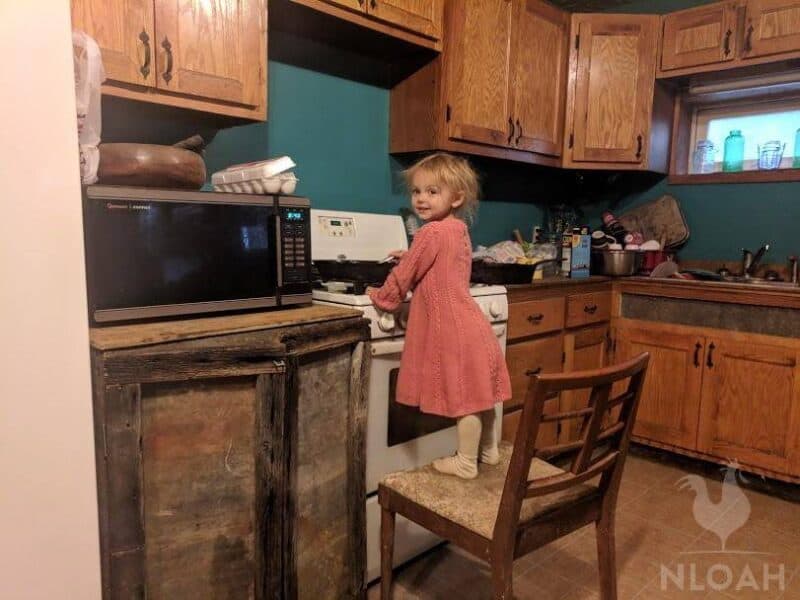
They Shouldn’t Prepare Cold Food Ingredients
Toddlers can help peel, chop, and grate herbs and vegetables under adult supervision, in most cases.
Going solo on this activity will depend on what type of tool is being used, and on how mature the child is to ensure he or she can safely use sharp objects.
Typically, grating vegetables and cheeses, as well as breaking eggs without getting the shells in the mix, can occur fairly independently around age five or six.
They Shouldn’t Cut Hard Food With a Butterknife
Sometimes, parents or grandparents want to allow a young child to help with food preparation and know they are not yet ready to handle a sharp knife, so give them a safe alternative, instead.
There are several reasons not to kid-proof the kitchen chores. First, the child will get frustrated because the butterknife will not cut through the apple or similarly hard food.
At best, the child will end up sawing into the apple and making a big mess of the fruit. This exercise will not teach a child how to properly and safely cut food with a knife, not by a long shot.
If the child is not mature enough, strong enough, or old enough to use a sharp knife solo, try doing hand over hand with the child so he or she becomes accustomed with the proper cutting motion and can achieve success by following your instructions.
The butterknife can slip off of the slick apple and wind up knicking the child’s skin with its slightly serrated edge, anyway.
Leave Their Plates and Cups On the Table – All children age two and above should be able to clean up after themselves at the table. Teach this personal responsibility skill early.
Even if the child is only taking his or her utensils, plate, and cup to the sink or trash can, they learn that there is no maid on the homestead, and that everyone has to do their part during meal time.
If you keep a kitchen composting pail, teach the toddlers how to scrape their plates into the bin, reminding them each time why the family saves their scraps instead of wasting them.
They Shouldn’t Measure Ingredients Alone
Although even three year olds can help mommy or grandma measure ingredients, children should not take care of this task without direct adult supervision until they are at least six or seven years old.
It is not usually until this age that children have developed the fine motor skills necessary to successfully complete detailed tasks.
Keeping the measuring cup level when dealing with liquid and understanding what “firmly packed” means requires a child who is mature enough to comprehend more intricate directions.
When deciding what your children can and cannot do in the homesteading kitchen, understanding what they are physically capable of and then building upon those basic foundational skills, will help generate success.
Here’s What Kids CAN Do in the Kitchen
The list of things to never let kids do in the kitchen highlights the most common and frequent food preparation chores on the homestead. But, there are scores of little things that children can do from even the toddler age, to help their parents prepare the food they grow and raise.
Getting a greater understanding about the physical and maturity levels of specific child age groups will allow you to involve the kids in everyday kitchen activities.
Perhaps most importantly, it will lay the groundwork so they are one day prepared to engage in all the ‘don’ts’ ‘ specified above.
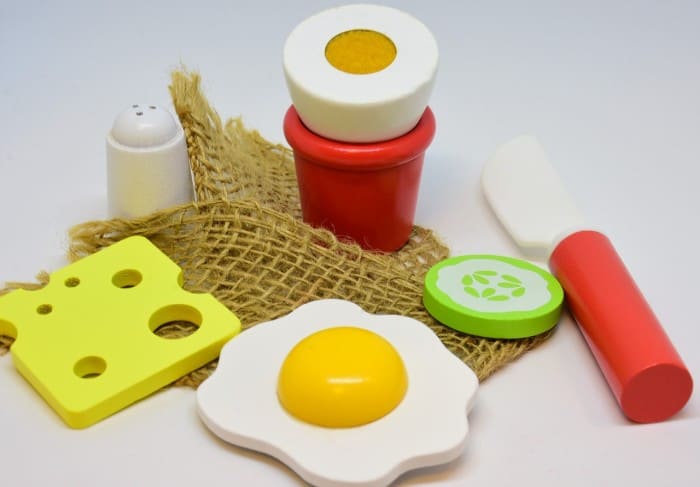
Things Children Under 2 Can Do In The Kitchen
At this age, the littlest ones in the family merely need to be exposed to the kitchen to help garner a sense of what goes on there.
Place the wee ones safely out of the working space on a blanket with some pretend food and play kitchen set – or just give them wooden spoons and non-breakable pots and pans of bowls to play with.
Before long, the under two family members will be mimicking your actions, and stirring plastic carrots and apples in their little pot – the first step on a long journey to creating a competent homesteading cook!
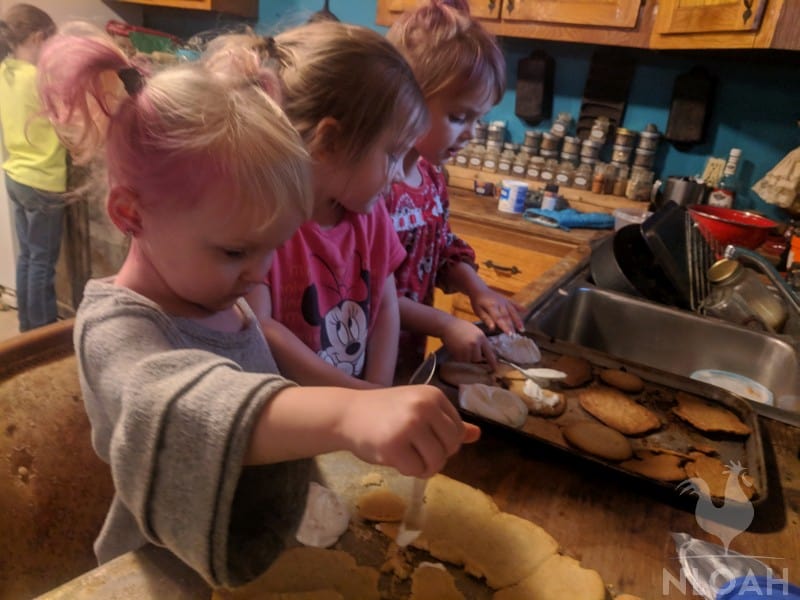
Things Toddlers Can Do in the Kitchen
- Ice cookies
- Wash fruits, vegetables, and herbs
- Stir cold ingredients
- Cut soft foods (bananas, strawberries, cheese, etc.)
- Tear up bread for dressing
- Mash crackers for meatloaf and chicken salad recipes
- Manually mash potatoes
- Use cookie cutters for desserts and ornament making
- Wash and dry plastic non-sharp dinnerware, drinkware, and wooden utensils.
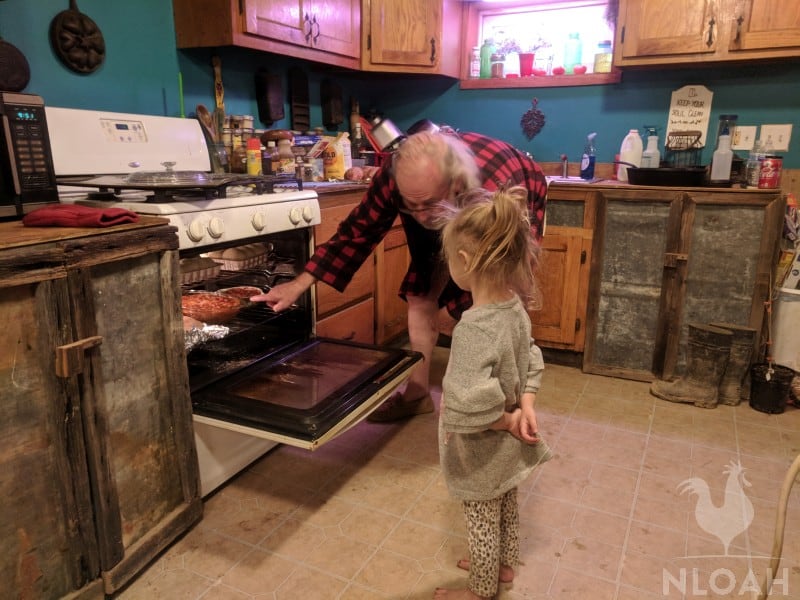
Things 3 to 5 Year Olds Can Do in the Kitchen
- Watch breads bake in the oven to learn to tell when they are done.
- Stick a meat thermometer into a entree being prepared after it has been removed from the oven to see if it reaches the proper temperature – under adult supervision.
- Aiding in the breading and flouring of entree ingredients.
- Tear apart greens, and mix in cut veggies or fruit to make a salad.
- Running food items through a sieve or colander.
- Light kneading of dough to help you finish a recipe step.
- Butter bread or spread icing.
- Use a mortar and pestle – this can still get messing without direct adult supervision.
- Wash non-breakable and dull-edged kitchen utensils, plates, bowls, etc.
- Roll out dough – with adult supervision.
- Removing vines and leaves from produce.
- Snapping green beans or peas with adult supervision, at least at first.
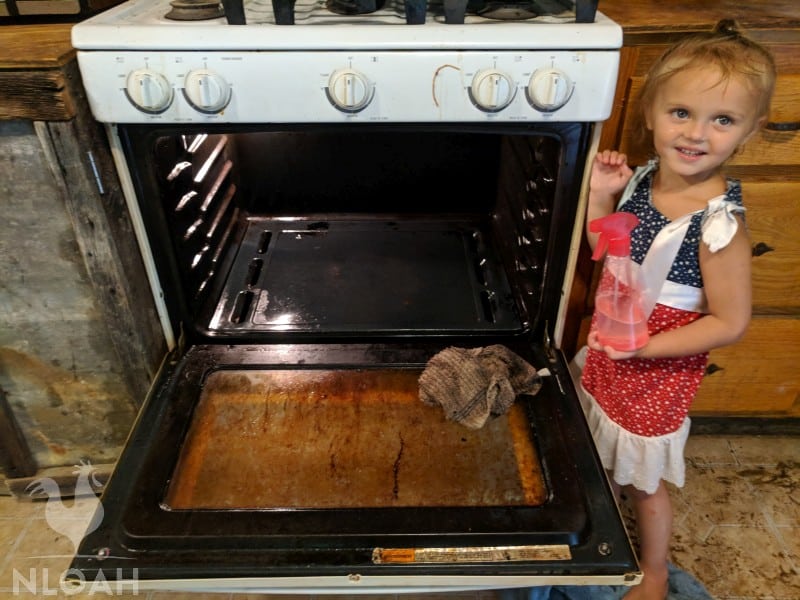
If you use a non-toxic cleaning solution, like the New Life On A Homestead oven cleaner recipe, children in this age group can even learn how to help keep the stove and oven tidy.
Things 5 to 7 Year Olds Can Do in the Kitchen
By this age, most children can be introduced to electronic kitchen appliances, and start to learn how they work and press buttons on the machines under adult supervision.
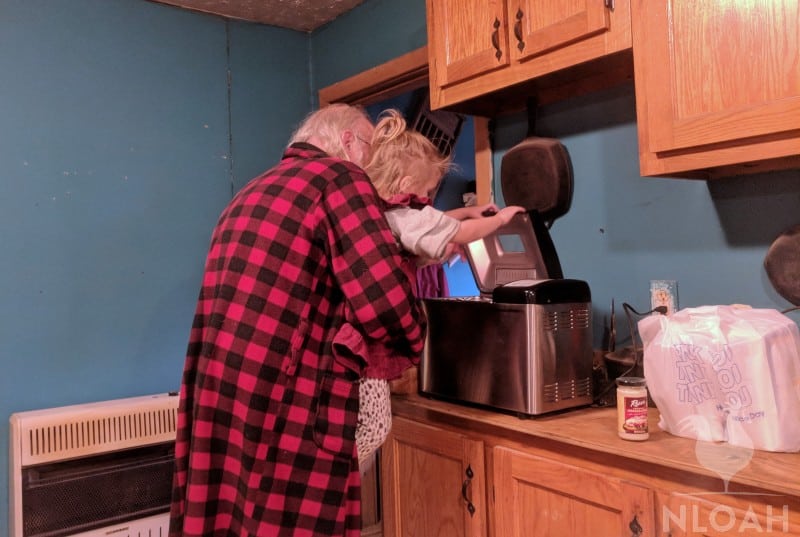
- Start to learn how appliances in the homesteading kitchen work, and assist in their use.
- Use a manual grater.
- Cut medium to hard foods with a small sharp knife under adult supervision – perhaps with hand over hand aid.
- Use kitchen scissors or their own child-sized version of scissors, to open packets etc. during the cooking process.
- Measure dry ingredients under adult supervision.
- Beat eggs manually
- Set the table
- Peel hard boiled eggs, fruit, and vegetables.
- Place items on a vegetable, cheese, or fruit tray.
- Use the microwave.
- Place food items in a toaster oven and bread in the toaster.
- Locate ingredients in the kitchen or cabinet.
- Make themselves and others simple sandwiches.
Things 8 to 11 Year Olds Can Do in the Kitchen
- Use many kitchen appliances on their own – starting with an electric can openers.
- Assist in family meal planning.
- Use a potato peeler, and other manual kitchen tools independently.
- Follow simple recipes – under adult supervision.
- Place recipes in the oven – under adult supervision.
- Stir hot ingredients.
- Use a medium sized sharp knife – possibly still under adult supervision.
- Unload garden harvest baskets or store-bought groceries independently.
- Wash breakable and sharp items (within reason based upon their maturity level) in the sink, or load them into a dishwasher.
- Use the stove top under adult supervision.
- Manually juice fruits and vegetables.
- Operate a kitchen timer independently.
Things Children 12 to 14 Can Do in the Kitchen
- Operate the stove and oven independently.
- Make complex recipes, and perhaps even add their own flavor twist into the mix.
- Use sharp knives (in most but not all cases).
- Prepare a simple meal for themselves or others.
- Run the dishwasher independently.
- Knead dough properly.
- Understand cooking science well enough that they can soften and not melt butter, separate eggs, etc.
- Safely handle raw meat and eggs.
- Measure all ingredients accurately.
- Understand kitchen hygiene concepts, and properly clean work space like a cutting board etc.
- Successfully make simple decorations on desserts independently.
- Zest oranges and lemons.
Things Older Teens Can Do in the Kitchen
- Prepare an entire meal by themselves.
- Cook outdoors with cast iron and clean it properly.
- Operate more complex kitchen appliances safely, like a food processor or Instant Pot.
- Make dough on their own.
- Operate a charcoal or gas grill or smoker.
- Do more intricate decorating on cupcakes, pies, cakes, etc.
- Properly sharpen a kitchen knife.
Final Words
The homesteading kitchen should be viewed as a lively, aroma filled, interactive classroom.
There is no other room in the house where the kids have the opportunity to learn so much about not just homesteading skills, but soak up the knowledge that will help them become independent and responsible adults.
If you start working with the children in the kitchen at a young age, they just might surprise you with how quickly they grasp the safety lessons you are teaching them.
Soon enough, they’ll become great assets not just at dinnertime, but when the family is ultra busy putting up the garden harvest, and planning large holiday and special event dinners.
Even though the children may seem mature enough to handle a given task – one they may have completed successfully many times before, always err on the side of caution and never leave anyone under the age of 18 to work in the kitchen without an adult at least being present inside the home.
Are there any other things you don’t let your kids do in the kitchen? Are you on the safe side or, on the contrary, the more kids help in the kitchen the better?
Share your thoughts below, and don’t forget to pin this on your favorite Pinterest board!
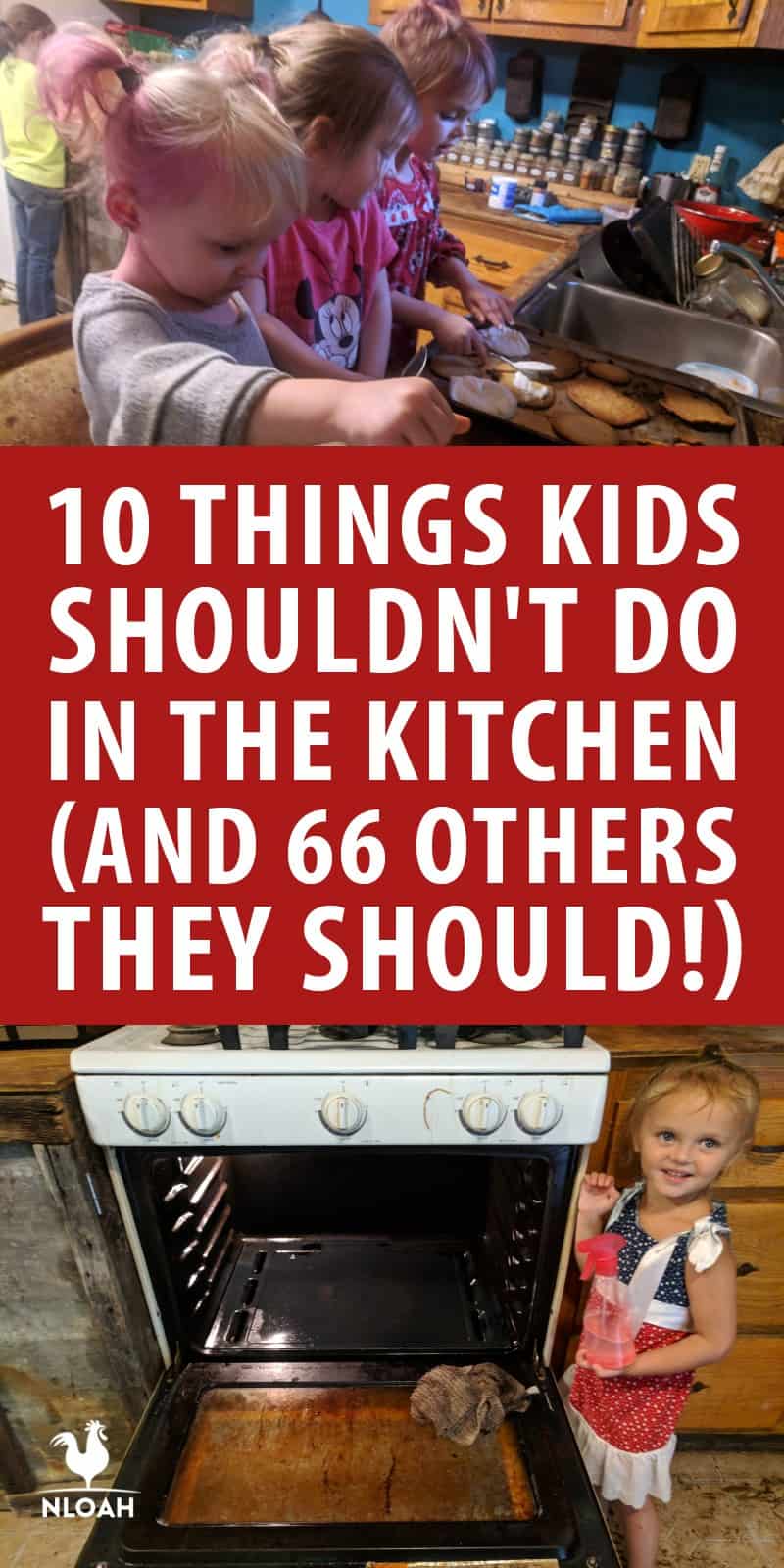

Tara lives on a 56 acres farm in the Appalachian Mountains, where she faces homesteading and farming challenges every single day, raising chickens, goats, horses, and tons of vegetables. She’s an expert in all sorts of homesteading skills such as hide tanning, doll making, tree tapping, and many more.
